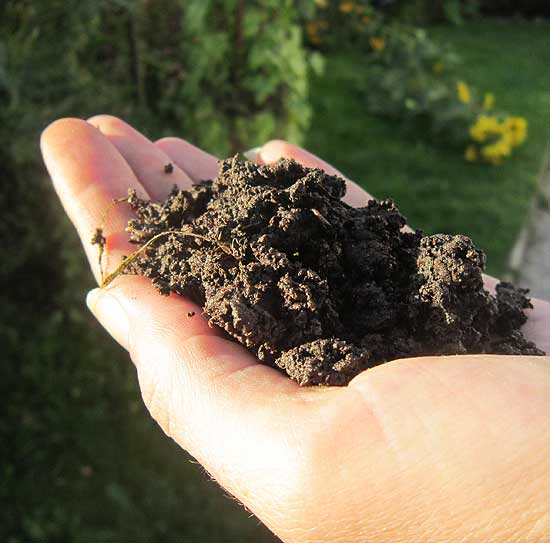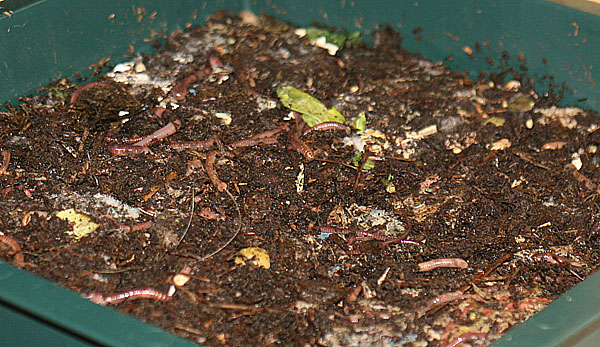In agriculture and horticulture, composting is an age-old method of organic fertilization. Worm compost, known as vermi-compost, is particularly rich in nutrients and valuable as a fertilizer. (Latain: vermis = worm.)
This compost is considered to be of great importance in organic farming and it contributes significantly to the preservation and improvement of soil structure.

In Southeast Asia, for example, it has been used to maintain soil fertility for 6,000 years, as many tea and coffee farmers use the manure produced by their small herds of cattle as a feed substrate for worm composting to sustainably increase crop yields.
The transformation of organic materials produces a deep black, odorless, crumbly substrate that resembles the soil found in deciduous and mixed forests and provides a balanced nutrient composition for plants. The valuable and nutrient-rich worm compost is then used as fertilizer on tea and coffee plantations.
Contents
Nutrient rich worm compost
Due to its voracity, no other animal copes better with organic waste than the compost worm. In addition, it can process and excrete well-mixed and diverse waste into worm humus relatively quickly in its intestinal tract. These crumbly heaps are more fertile than all other types of soil. Due to its soil-improving and plant-strengthening effect, worm compost promotes the growth and fertility of plants.
Note: Every day ONE single compost worm processes half of its body weight into worm humus!
Usually compost worms do not need to be purchased separately, because the native worm finds its way into good compost by itself. However, for this purpose, the waste should be well mixed and the first rotting phase should have begun.
Likewise, worm compost requires special conditions: it must be protected from the wind, warm, properly filled, moist and always filled with new, suitable material. Proper and regular stratification, adequate moistening and warm temperature makes the difference from the conventional one to allow the worms to work diligently and multiply.
Many amateur gardeners even use worm composters, taking advantage of the compost worms’ appetite for all fresh plant waste.
A layer of deposited manure is especially popular – as it is particularly rich in nutrients and warm – the compost worms love a temperature around 26 degrees Celsius, but will perish at sub-zero temperatures or above 40 degrees!
The compost worm feeds on almost any organic matter undergoing decomposition, whether acidic or alkaline, and turns this into worm humus. It serves as a natural soil conditioner by helping with soil aeration and the breakdown of heavy metals.
Worm humus – “The gardener’s gold”.
Worm humus is one of the most precious natural substances and free from any chemical synthetic additives. Although the nutrient composition varies, worm humus is indispensable especially for use in degraded soils.
Worm humus meets all the requirements for healthy plant nutrition and is an intensive slow-release fertilizer, as the proportion of nitrogen, phosphorus and potassium is much higher than in normal arable or garden soil.
Even small amounts of 1 to 10 percent, in garden soil improved with worm humus, produce positive results. Plants are more productive, bloom longer and are less susceptible to disease, bacteria and fungi.
Instructions for preparing worm tea for fertilization:
Now here is a practical instruction in video format, how to prepare a so-called “worm tea”:
Fertilizer worm humus
Worm humus or also called worm earth is full of minerals and has a loose consistency. Worm humus can be used as a fertilizer and as an addition to fertilizers. When fertilizing with worm humus, the soil is constantly supplied with nutrients such as nitrogen, phosphorus, potassium, calcium, as well as magnesium and minerals in balanced amounts.
Due to the high content of regulating substances, the resistance of the plants is promoted. Thus, not only the loosening of the soil is achieved, but also the increase of water storage capacity. The neutralized and thus improved soil prevents, among other things, the formation of fungi that damage the roots of plants.
However, the quantity of enzymes and microorganisms is the most decisive thing about worm humus, because they enable the decomposition of toxic substances and prepare the living part of the soil in such a way that it is easier for the plants to absorb nutrients, which also protects against pathogenic microorganisms.
What makes the worm humus perfect for use in depleted soils or areas that are no longer able to regenerate and detoxify themselves due to the continuous use of weed killers or pesticides and artificial fertilizers.

To summarize:
- The worm humus is more valuable than normal compost, because it has a very high nutrient content and excellent structural properties.
- The advantage of worm composting: the worms require little space and you can already create a worm compost in a box on the balcony and terrace and obtain valuable humus.
- If ideal conditions prevail, the worm humus is already “ripe” for the garden after 3 to 5 months!
- Worm humus not only fertilizes, but also “revitalizes” the garden soil and only a little worm humus is needed (about 1 liter of worm humus per 1 square meter of garden bed) to optimally supply the garden soil. Likewise, plants supplied with it are more disease resistant and healthier!
- Even houseplants can be supplied with worm humus: here about one tablespoon per month is enough to provide all the nutrients during the growing season.
- Indian tea farmers have been able to record about 1/3 more harvest after using worm humus!

